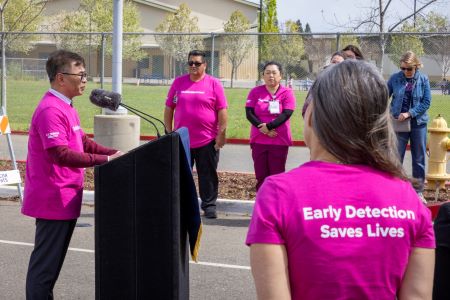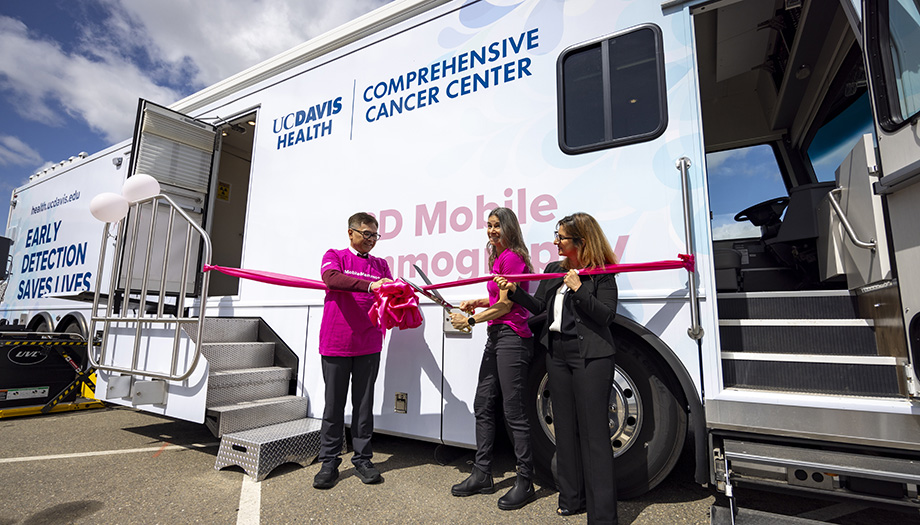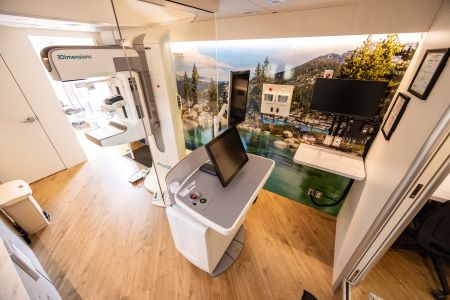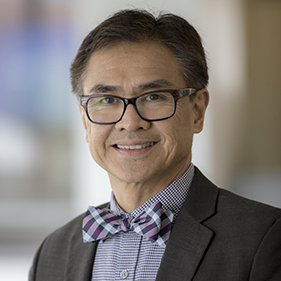A ribbon cutting was held today for UC Davis Comprehensive Cancer Center's first-ever mobile mammography clinic. The MobileMammo+ bus will serve marginalized and hard-to-reach rural communities to increase access to breast cancer screening.
"When people can't come to us — we will go to them," said cancer center Director Primo "Lucky" Lara Jr. "The tragic news is that while breast cancer rates are lower in rural areas, deaths from breast cancer are much higher. This is due to lower screening rates."

The MobileMammo+ bus will be parked at the UC Davis Health Elk Grove Clinic for several days a week and then travel to Federally Qualified Health Centers to serve communities throughout the region the rest of the week. In the future, MobileMammo+ may visit non-clinical locations such as churches and social service agencies.
Research lab on wheels
Services on the 45-foot-long clinic-on-wheels include mammograms, multilingual care and health education. The mobile clinic also serves as a data collection hub for health equity research led by Diana Miglioretti, breast cancer researcher and UC Davis biostatistics division chief. She also co-leads the cancer center's Population Sciences and Health Disparities program.
"More than 30% of people are inadequately screened for breast cancer and rates are even lower among marginalized communities," Miglioretti said. "The mobile mammography service helps us gather crucial data for health equity research, which will help us tailor our cancer prevention programs and deepen our understanding of breast cancer in diverse populations."
Over a five-year period, data collected on MobileMammo+ will help build a repository of long-term data on breast cancer screening, diagnosis and treatment.
"The idea is to develop effective, individualized care by leveraging leading-edge genomics and AI (artificial intelligence) to predict breast cancer risk in underserved women," Miglioretti said.

Increasing access to breast cancer screening
Patients in many rural and urban communities struggle to access preventive health care due to barriers including transportation, insurance, language differences and distance to a provider or clinic.
The project will draw on expertise from Shadi Aminololama-Shakeri, chief of breast radiology at UC Davis Health. Also involved is Laura Fejerman, a leading researcher of breast cancer in Latinas and co-director of the cancer center's Women's Cancer Care and Research Program. Fejerman is associate director for the cancer center's Office of Community Outreach and Engagement and co-director of the Latinos United for Cancer Health Advancement initiative.
"We want to build and implement a multi-faceted program to improve cancer screening and diagnosis that incorporates traditional and innovative approaches that will lead to more effective and personalized strategies for underserved communities," Fejerman said.

Bringing mammogram screening to communities
Staffed with a certified breast imaging technologist, MobileMammo+ will perform services that mirror the radiology expertise at UC Davis Health clinics. "This will allow us to offer state-of-the-art 3D mammography to under-resourced and remote communities," Aminololama-Shakeri said.
Offered on board will be breast cancer screening education, outreach and navigation services to increase screening participation and patient navigation to ensure that follow-up diagnostic imaging and breast cancer treatment are received, if indicated.
"We hope to screen nearly 5,000 women a year," said Alyssa Reed, senior program manager for MobileMammo+.
Reed, a breast cancer survivor, stresses the importance of early detection. Mammograms can correctly identify about 87% of breast cancers in women.
"We know that the earlier breast cancer is caught, the greater the chances of successfully treating that cancer," Reed said.
Screening for other cancers in the future
Cervical cancer screenings also may soon be available on MobileMammo+ through human papillomavirus (HPV) self-testing.
"The cancer center is seeking additional funding to conduct a study on the mobile mammography bus that uses HPV testing kits to increase cervical cancer screening rates," said Julie Dang. She is executive director of the cancer center's Office of Community Outreach and Engagement and conducts studies focused on HPV-related cancers.
HPV vaccinations and colorectal cancer FIT tests may also be brought on board as MobileMammo+ expands in future years.
When people can't come to us - we will go to them." -UC Davis Comprehensive Cancer Center Director Primo "Lucky" Lara Jr.
Funding for MobileMammo+
Initial funding for MobileMammo+ came from a settlement award that arose from a class-action lawsuit against Wyeth Pharmaceuticals. The lawsuit alleged that Wyeth misrepresented the benefits and risks of its hormone replacement therapy medication for women.
When money remains after eligible class members receive their claim payments, courts can distribute those residual funds to charitable causes. The proposed mobile mammography service was one of the recipients of those surplus Wyeth settlement funds.
Funding is key for multiplying the impact of MobileMammo+
Expansion of the mobile mammography service depends upon philanthropic support as well as grants.
"There is so much more we would like to do to increase access to cancer screenings and save lives," said Miglioretti. The mobile service, she added, may be able to perform other types of cancer screenings down the road.







